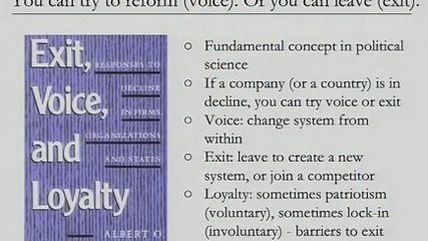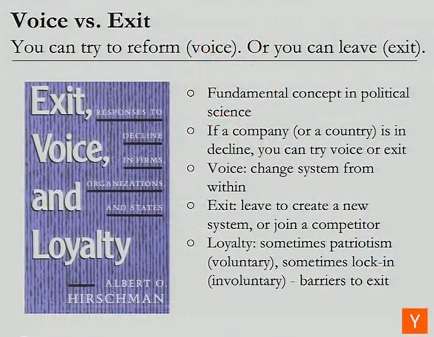Tech Should Make It Easier To Escape Government Control, Says Startup Veteran Balaji Srinivasan


"If a company or country is in decline," says Balaji Srinivasan of Stanford University and genomics startup, Counsyl, "you can try voice or you can try exit." Speaking at this year's Startup School, sponsored by tech "seed accelerator" Y Combinator, Srinivasan talked up the liberating and enriching effect technology has had on the world, and the backlash it's facing from what he referred to as the "paper belt" of old-line power centers. Silicon Valley—technology innovators in general—can and should use their voice to argue back, he says, but ultimately must be prepared to exit the system in a way that doesn't prevent fans of the old paper belt from enjoying the system they already have.
Echoing a 1970 book by Albert O. Hirschman, Srinivasan says "voice" involves changing the system from within, while "exit" is "leaving to create a new system, a new startup, or to join a competitor, sometimes." Voice in the context of a country, he says, is voting, while exit is, classically, emigration. Beyond that, though, and of relevance to his technically savvy and entrepreneurial audience, exit means "giving people the tools to reduce the influence of bad policies over their lives without getting involved in politics; the tools to peacefully opt out."
America has been shaped by both voice and exit, says Srinivasan, both in terms of people coming here from elsewhere, and people migrating internally, state to state and company to company, to escape rules, structures, and bureacracies they disliked. "Exit amplifies voice," he adds. When people see others fleeing what they like, it emphasizes the value those others place on competing choices. For that reason, "a crucial additional feature for democracy is to reduce the barrier to exit" because "voice gets much more attention when people are leaving in droves."
"I believe the ability to reduce the importance of decisions made in D.C., in particular, without lobbying or sloganeering, is actually going to become extremely important over the next ten years," he says. The startup veteran and academic emphasizes that he uses "D.C." as a euphemism for political authority at all levels that people might want to escape and that isn't so eager to be evaded.
Srinivasan references Google CEO Larry Page's recent call to "set aside a part of the world" for unregulated experimentation, and venture capitalist Marc Andreessen's prediction of rapid creation of new countries in the years to come. But those new spaces don't have to be location-based, he argues. 3D printing will make it impossible to ban physical objects. Virtual currencies like Bitcoin can render capital controls unenforceable and put stored wealth beyond the reach of the state. Telepresence and remotely controlled robots will allow people to "be" anywhere without physically crossing a border.
And the new generation of tech innovators have a role to play in continuing to break down barriers to exit by producing tools that free people from political and legal controls. What he's calling for, ultimately, is a form of internal secession defined in extent and form by those seeking exit, and served and empowered as a market opportunity or series of opportunities by entrepreneurs. This isn't a new option—Hirschman wrote about it decades ago and anybody drinking at a speakeasy in 1925 lived it—but it's an option that Srinivasan sees becoming much more powerful and available in the years to come.
There may never be an app for freedom, but technology promises to make freedom a lot more accessible, and its enemies relatively weaker, than in the past.
Editor's Note: As of February 29, 2024, commenting privileges on reason.com posts are limited to Reason Plus subscribers. Past commenters are grandfathered in for a temporary period. Subscribe here to preserve your ability to comment. Your Reason Plus subscription also gives you an ad-free version of reason.com, along with full access to the digital edition and archives of Reason magazine. We request that comments be civil and on-topic. We do not moderate or assume any responsibility for comments, which are owned by the readers who post them. Comments do not represent the views of reason.com or Reason Foundation. We reserve the right to delete any comment and ban commenters for any reason at any time. Comments may only be edited within 5 minutes of posting. Report abuses.
Please to post comments


Why do all these Tea Party anarchists want to escape government control? Don't they want to pay their fare share? What kind of world would we have if everyone could just do whatever they want?
Virtual currencies like Bitcoin can render capital controls unenforceable and put stored wealth beyond the reach of the state.
Wanna bet?
Yes. I will win this bet.
Ask Pirate what's his name from the silk road. The Guv'mnt seized his bitcoins.
This is precisely what I was going to say. If Bitcoins can be 'seized' they're not purely virtual. In fact, that's the draw of bitcoin. The U.S. Dollar is arguably more virtual than bitcoin. They can just print more dollars. I can't print more bitcoins.
Interesting line of thought; how does one have a currency that isn't seizable besides labor?
He made stupid mistakes and I'm sure that the seizure of some of his BTC was related to stupid mistakes.
The problem is he made stupid mistakes which were very easy to make, hence a lot of the people who will be busted in the future are/have/will make the same mistakes.
He painted a huge target on his own back, and they traced him through other means than his bitcoin activity.
If all you're doing is evading capital controls, your attack surface is much smaller.
I predict within ten years the Federal Government will pass law to create government control of 401k accounts. The alleged reason will be to protect investors. The real reasons will be to force feed US bonds in order to further monetize the debt, and to hold onto assets of the middle class to prevent them from leaving. That along with stiff expatriation taxes. In other words, all ur dollars are belong to us.